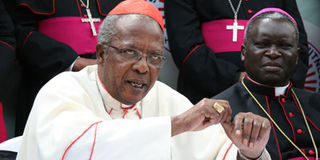Don't tax basic goods, Catholic Bishops urge

John Cardinal Njue (left) flanked by the vice chairman of Kenya Conference of Catholics Bishops, Rt. Rev Philip Anyolo (right) address a press conference after the official launch of the Kenya Conference of Catholic Bishops on June 28, at the Consolata Shrine in Nairobi. The Catholic Church is against imposing taxes on basic commodities saying doing so would burden Kenyans further. JENNIFER MUIRURI
The Catholic Church is against imposing taxes on basic commodities saying doing so would burden Kenyans further.
At a press conference in Nairobi Friday, the church’s new top organ Kenya Conference of Catholic Bishops, said most Kenyans are poor and the government has no “moral authority to tax” them further.
"We are deeply concerned by the government’s attempts to increase the taxes and therefore the prices of basic commodities and services,” the Bishops led by John Cardinal Njue said.
“We remind the government that despite the increase in Kenya’s budget and government income, majority of Kenyans are poor, jobless and lack a stable source of income.”
The government has prepared a VAT Bill 2013 in which it plans to impose value added tax on goods previously zero-rated. They include bread, milk, maize flour, sanitary pads and newspapers.
But the proposal has irked consumer groups, which have been holding protests against the Bill.
Forestall industrial action
On Friday, the Bishops also called for dialogue to end the teachers' strikes and forestall any further industrial action.
“While not disputing the legitimacy of such clamour for better pay and working conditions, we warn that this trend could snowball and render this country ungovernable,” warned Cardinal Njue in a statement signed by 27 other Bishops.
The clergy argued that MPs had set a bad precedent by demanding higher pay, a trend which has been adopted by other civil servants.
The Kenya National Union of Teachers (Knut) called a nationwide strike on Monday to demand implementation of a pay deal agreed with the government in 1997.
“When will this cycle of industrial action come to an end? Can’t we learn to solve our demands and differences amicably following channels of dialogue?” Cardinal Njue posed.
“Our reckless actions jeopardise the future of our children, the lives of the sick and defenceless, and indeed our nation as a whole.”




